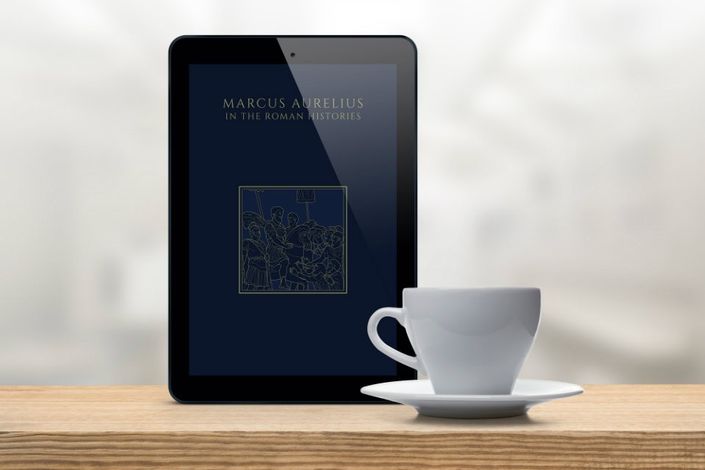
Marcus Aurelius: Life and Stoicism
Learn how to build emotional resilience and develop a more meaningful life, from Marcus Aurelius, with my 4 week intro to Stoic philosophy and psychology.
Watch Promo Enroll in Course
Enrolling now. This course is about the Stoicism of Marcus Aurelius, one of the good Roman emperors! It has been specially selected by Teachable, from thousands of online courses, to be featured on their Discover site. I'm the author of several books on philosophy and psychotherapy including How to Think Like a Roman Emperor: The Stoic Philosophy of Marcus Aurelius, a #1 best seller in philosophy, reviewed by over 6,000 users on Goodreads, and translated into eighteen languages. I also edited and wrote the introduction to the new Capstone edition of The Meditations, a new graphic novel about Marcus Aurelius called Verissimus, and a forthcoming prose biography of him for Yale University Press.
Join me as we practise tried and tested methods for applying Stoic wisdom to daily life. We'll be exploring Marcus' life and philosophy as guides for modern living, drawing on elements of modern psychology to help us make use of Stoic practices. You'll learn practical techniques for coping with challenges such as anger, fear, pain, illness and loss, using Marcus Aurelius as our guide to mastering difficult emotions. If you want to learn how to approach life like a Stoic, this is the place to start. And relax, it's risk free: you have 30 day money-back satisfaction guarantee. (See FAQ for details.)
Who is this course for? Anyone who's interested in Stoicism or Marcus Aurelius. If you're a complete newcomer this course will provide the perfect introduction to Stoicism. Even if you've read a lot of books on Stoicism, though, you'll still benefit from these new resources and by exploring a fresh perspective on the subject.
Enrollment: Enrollment is now open,
Price: Click enroll button for current prices.
(NB: All prices are in $ USD unless otherwise stated; the law requires VAT to be added for users based in the EU.)
Start Date: You can enroll right now on the continuous intake version of this course and begin immediately.
Duration: The core content requires about fifteen hours to complete on average, usually spread over five weeks or more. However, there are also many hours of additional optional content included.
Bonus: You'll also receive three free e-books for your collection, which we've carefully edited and designed for use on all devices: The Meditations of Marcus Aurelius, The Eulogium on Marcus Aurelius, and Marcus Aurelius in the Roman Histories. These come in EPUB, Kindle (MOBI) and PDF file formats.
NEWS: My latest book How to Think Like a Roman Emperor: The Stoic Philosophy of Marcus Aurelius was is available from online bookstores. It's inspired by this course but contains entirely new material so even if you've completed this course you'll still find the book very valuable to read.

Thanks Donald for your personal perspectives, the anecdotes and breadth of applied experience with Stoicism; the practical and historical perspectives, using Marcus Aurelius' Meditations , were very insightful and valuable also for long-term retention. Lots of thought-provoking material here to read and re-read. Many thanks. The course concept and contents are highly recommended. (I came close to turning this course down – but am greatly relieved now that I registered at the last minute!) – Sachigo
Hello and thanks for taking an interest in my course,
I've been studying Stoicism for over twenty years and giving talks, writing about it, and getting in heated debates about it for almost as long. Based on that experience, I've arrived at a conclusion about the way people normally teach Stoicism... Talking about the philosophy in a slightly abstract way, like scholars tend to, just keeps running into the same old problems again and again. I've discovered that there's a much better way to learn about Stoicism. At the beginning of The Meditations, Marcus Aurelius spends a whole chapter carefully reminding himself of the most important things about the most important people in his life, his family and teachers. That's the way he introduces the subject. In particular, he meditates at length on the virtues of the emperor Antoninus Pius, his adoptive father. That's because the Stoics believed that the best way to study their philosophy is by contemplating the virtues of others, especially those we can most admire. Naturally, we don't know as much as Marcus did about the characters of Antoninus Pius and his other personal role-models. However, we do know quite a lot about Marcus himself, enough to provide us with a model of Stoic virtue to study and contemplate.
We know about his inner life as Stoic philosopher through The Meditations, his reflections and conversations with himself. And we know enough about his outer life, as Roman emperor, to fill a substantial biography. We have letters between him and his beloved rhetoric teacher Fronto, descriptions of his reign in the Roman histories, and a few other historical bits and pieces. Focusing on Marcus as our concrete example, just as he focused on Antoninus Pius and his Stoic teachers, we avoid many pitfalls by putting a human face on Stoicism. For example, whereas people sometimes assume the Stoics might be so accepting that they become overly-passive, we can see how Marcus was in fact committed to vigorous action in the service of his Stoic values, both his political life and as a military commander. Whereas people think Stoicism may be cold-hearted or unemotional, we can see how Marcus interpreted it as a philosophy of brotherly love and the emphasis he placed on interpersonal virtues like justice, kindness, and fairness to others.
Marcus is without question the most famous Stoic, in the eyes of modern students, and the one about whose life the most is known, because he was an important Roman emperor. By approaching Stoicism through the life and character of Marcus, taking him as our own Stoic example, we arrive at a much more balanced and more appealing conception of the philosophy than by studying it in a more abstract and theoretical way. He began The Meditations in that way for a reason. It's by studying real-life examples of Stoicism being applied in daily life, as an art of living, that we can best grasp the true meaning of the philosophy.
Warm regards,


Nobody exemplifies Stoicism as does Marcus Aurelius. Because of the extremely difficult and unpredictable events that came into his life when he became Emperor, his embodiment of Stoic ideas burned in his blood and he saw that life is not worth it's living unless you recognize how critical it is for wisdom to be your primary guide to lead you on your way… moment by moment inch by inch. A year ago i would not have imagined about how to think like a Roman Emperor. Now a days it is the only game in town worth playing. – Melville Richard Alexander
 Course Content
Course Content
The course consists of many audio and video recordings, audio downloads of Stoic psychological exercises, excerpts for discussion, special infographics created by our graphic designer Rocio de Torres, written articles, group discussion questions, and short interactive knowledge check questions to aid learning and retention. There are a lot of resources here that I simply wouldn't be able to put into a book. Each week focuses on a different set of core Stoic philosophical concepts, psychological exercises, and a particular problem area, such as anger management, coping with pain, overcoming worry and anxiety, and letting go of attachment.
Welcome Section
This becomes available as soon as you enrol and contains carefully selected preparatory materials to help you get up to speed and prepare for the main four weeks. Includes: videos, quotes from Marcus, recommended reading, and discussion questions, and knowledge-check quiz.
Week One: Overcoming Anger and Developing Empathy
The Education of a Stoic Emperor. This section focuses on the Stoic practice called "Contemplation of the Sage" and the role of empathy in Stoicism, particularly as a remedy for feelings of anger. It uses illustrations from the life of Marcus, such as his difficulty coping with feelings of anger toward his Stoic tutor, Junius Rusticus. Includes: Videos, reading, discussion, knowledge-check quiz. Also, for students on standard or premium plan, a webinar on Stoicism, Virtue, and Empathy.
Week Two: Conquering Worry and Anxiety
Marcus' Early Reign and the Parthian War. This section focuses on the Stoic practice called "Premeditation of Adversity" (praemeditatio malorum, sometimes called "negative visualization") and the role of acceptance in Stoicism, toward indifferent things, such as in coping with pain. It uses illustrations from the life of Marcus, such as his worry about matters of state, coping with chronic pain and illness, and his correspondence with his Latin tutor Fronto. Includes: Videos, reading, discussion, knowledge-check quiz. Also, for students on standard or premium plan, a webinar on Stoicism, Indifference, and Acceptance.
Week Three: Managing Pain and Illness
The First Marcomannic War and The Meditations. This section focuses on the Stoic practice called "The View from Above" and the role of metaphysics in Stoicism, with reference to the famous Dream of Scipio. It uses illustrations from the life of Marcus, such as the challenges of his assuming the role of military commander during the lengthy northern campaign against a huge coalition of enemy tribes led by King Ballomar of the Marcomanni. It is widely believed that Marcus wrote The Meditations during this period, and we also consider its role as a spiritual journal in relation to other Stoic writing practices. Includes: Videos, reading, discussion, knowledge-check quiz. Also, for students on standard or premium plan, a webinar on Stoicism, Nature, and the Cosmos.
Week Four: Coming to Terms with Mortality and Loss
The Civil War, and Marcus' Final Years and Legacy. This section focuses on the Stoic practice called "Contemplation of Death" and the concept of impermanence in Stoicism, and also on the practice of Stoic mindfulness (prosoche) and attention to the present moment. It uses illustrations from the life of Marcus, such as the Antonine Plague, the civil war against his general Avidius Cassius, and his own illness and eventual death. Includes: Videos, reading, discussion, knowledge-check quiz. Also, for students on standard or premium plan, a webinar on Stoicism, Mindfulness, and Death.
NB: Course curriculum may be subject to change without notice. That's because I'm continually trying to improve it based on your feedback and my research.

This course matters in ways that so many forms of education fail to even touch. It deals with your perspective: how you think, your attitude, how you perceive yourself and life, and what really matters in life. You can learn perishable (but temporarily useful) skills like computer programming and the rules to accounting all day long, but the ideas and wisdom in this course do not perish. Following wisdom and the Stoic mindset is useful whatever one does in life. It is positive nutrition for the mind... This course is an exploration of how to deal positively psychologically, cognitively, and socially with the human condition as dictated by Nature. I highly recommend it. – James D. Joslin

A well prepared course with an instructor who not only knows his subject but understands that adult learners will each have their own reasons for participating and will do best when they can proceed at their own pace. The course material and comments will always be available to me so I can and will go back. I knew a bit about Stoicism when I started and learned much. I expect complete novices as well as the well informed would benefit. – Wilfred Allan

If you would like a course on Stoicism which provides an overview of the philosophy, historical context, real-world examples to learn from, different types of media and an incredibly interesting character from history, then this course is for you! I highly recommend it for the new Stoic looking for information and techniques to apply their philosophy to their life! – Adam Piercey

I would definitely recommend this course. It is a great overview of Stoicism. Using Marcus Aurelius as a role model is brilliant! – Moonhorse

This course brings today's remaining extant Stoic literature to life. Personally, I have read Epictetus, Seneca, Marcus Aurelius and modern Stoicism commentaries. Yet, this course presents Stoicism from Marcus' practical life – his everyday challenges as a normal man and as a highly responsible emperor. He was able to mediate these challenges with Stoic philosophy. Donald Robertson served as a reliable guide using his CBT background and focused scholarship of Stoicism in general and Marcus Aurelius' Meditations in particular. I feel like this course has given me a Stoic Mentor/Model to emulate and bring my ongoing Stoic readings to life. Yes, I now know that I have a "model" to follow as I continue my journey as a Stoic Student. – RG McNeill Jr

Yes I would recommend it. As a lifelong learner of technical, science and mechanical topics, I was hesitant to undertake this course. I am very glad I did. It has 'demystified' the topic of Stoicism. I look forward to continued readings. Thank you. – Noble Redmon

I would definitely recommend this course to anyone interested in Marcus Aurelius or Stoicism generally. The selections from the Meditations are chosen both for practical value and for their utility and examining our own views. For me this was the second time visiting Marcus' meditations, But this is the first time I feel like I've read them with my eyes wide open, in no small part to Donald Robertson's knack for facilitating online courses, and the wonderful group that I've had the opportunity to discuss the content with. – Ronald Willam Brady

Donald Robertson on Marcus Aurelius, what a treat! I have enjoyed the course immensely, have learnt a lot about M.A.´s ideas (despite having previously read the meditations a few times), and about the historical and personal context. I have found the analysis intelligent, insightful, profound and original. I can't wait to enrol in your next course. Thank you very much, it has been a transforming experience. I strongly recommend this course to anyone who ambition a wiser, better life. – Juan García
Your Instructor

 Donald is a trainer and writer, with decades of experience. He’s a specialist in teaching evidence-based psychological skills, and known as an expert on the relationship between modern cognitive-behavioural therapy (CBT) and classical Greek and Roman philosophy. He was born in Scotland but worked as a psychotherapist for many years in London, England, where he ran a training school for therapists, before emigrating to Canada to focus on his writing and developing eLearning courses. He now lives part-time in Athens, Greece.
Donald is a trainer and writer, with decades of experience. He’s a specialist in teaching evidence-based psychological skills, and known as an expert on the relationship between modern cognitive-behavioural therapy (CBT) and classical Greek and Roman philosophy. He was born in Scotland but worked as a psychotherapist for many years in London, England, where he ran a training school for therapists, before emigrating to Canada to focus on his writing and developing eLearning courses. He now lives part-time in Athens, Greece.
Donald is the author of several books on philosophy and psychotherapy, as well as having contributed chapters to four other books and published many articles in journals and magazines. How to Think Like a Roman Emperor: The Stoic Philosophy of Marcus Aurelius was #1 best seller in philosophy. He's also the author of Verissimus, a graphic novel about Marcus Aurelius, as well as a forthcoming prose biography of him from Yale University Press. He's edited and written the introduction to Capstone Classics' new edition of The Meditations of Marcus Aurelius. You can contact him via his website.
Course Curriculum
-
StartVideo: Welcome to the Course (6:33)
-
StartWelcome Letter from Donald Robertson
-
StartFacebook Community
-
PreviewVideo: Why Marcus? (8:34)
-
StartPoem from Manuscript of The Meditations
-
StartFavourite Quotations from Marcus
-
PreviewVideo: Course Overview (11:51)
-
StartDiscuss Excerpt: The Promise of Philosophy
-
StartRecommended Reading
-
StartInfographic: Important People in Marcus' Life
-
StartExercise: Self-Hypnosis for Stoic Attitudes (Revised)
-
StartYouTube Live Webinars
-
StartDiscussion: Welcome to Roman Emperor!
-
StartA Guide to Marcus Aurelius and Stoicism (PDF)
-
PreviewImpossible Quiz
-
StartSubstack Newsletter and Podcast
-
StartWhat Next?
-
StartIntroduction to Week One
-
StartWeek One Webinar
-
StartHow to use the Content
-
StartComic: The Town Mouse and the Country Mouse
-
PreviewVideo: The Stoic Goal of Life (Part 1) (7:35)
-
StartInfographic: The Three Stoic Topics
-
StartVideo: The Stoic Goal of Life (Part 2) (11:11)
-
StartInfographic: Stoic Unhealthy Passions
-
StartVideo: The Stoic Goal of Life (Part 3) (12:05)
-
StartInfographic: Stoic Healthy Passions
-
StartKnowledge Check: The Stoic Goal of Life
-
StartAudio: Stories about Marcus Aurelius the Man
-
StartInfographic: Stoic Virtue
-
StartDiscuss Excerpt: A Disciple of Antoninus
-
StartAudio: How Marcus Contemplated the Sage
-
StartExercise: Stoic Contemplation of the Sage
-
StartKnowledge Check: Contemplation of the Sage
-
StartDiscuss Excerpt: A Gift from the God of Healing
-
StartVideo: Stoicism, Empathy, and Anger (17:39)
-
StartAudio: Stories of Anger and Empathy
-
StartHow Marcus Developed Empathy
-
Start1. We are naturally social animals, designed to help one another
-
Start2. Consider their character as a whole
-
Start3. Nobody does wrong willingly
-
Start4. Nobody is perfect, yourself included
-
Start5. You can never be certain of others people’s motives
-
Start6. Remember we all will die
-
Start7. It’s our own judgements that harm us
-
Start8. Anger does us more harm than good
-
Start9. Nature gave us the virtue of kindness
-
Start10. It’s madness to expect others to be perfect
-
StartKnowledge Check: Anger and Empathy in Stoicism
-
StartDiscuss Strategies: How can Stoicism Help us Manage Anger?
-
StartWeek 1: What Next?
Courses Included with Purchase





